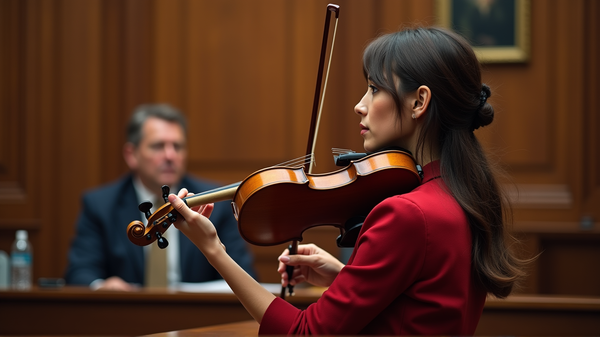Behind the Disqualification: Race Controversy at California Track Championships
In a narrative that continues to unfold with intrigue and emotion, Clara Adams and her father David have become focal points of a national conversation following a controversial decision at the CIF State Championships. At the center lies a celebration deemed “unsportsmanlike” by officials—a decision David Adams believes holds an undercurrent of racial bias.
The Celebration That Sparked a Controversy
Capturing the 400-meter dash championship, Clara commemorated her victory resembling the legendary Maurice Greene by theatrically using a fire extinguisher on her shoes. This homage could not shield her from immediate disqualification and the stripping of her state title—a move that now resonates across social media and national news.
Dissecting the Decision: A Historical Perspective
As David Adams voiced in a gripping interview on “The Will Cain Show,” the narrative deeply echoes the racial disparities that have long plagued celebratory expressions in sports. The juxtaposition he presents of reactions to celebrations by athletes of different racial backgrounds uncovers a thread of historical bias. “When a white athlete celebrates, it’s passion. For a black athlete, it’s deemed unsportsmanlike,” David asserts, stirring public dialogue about equality and fairness in sports. As stated in New York Post, it’s an unfortunate pattern observed over the years.
Clara’s Unbelievable Outcome: A Shock to the System
For Clara, the disqualification was an emotional jolt, replacing moments of glory with disbelief and frustration. She voiced the disbelief on Cain’s platform, revealing how a fleeting spectacle snapped her years-long journey with her father, leaving behind questions of merit and fairness.
Support and Silence in the Aftermath
While the California Interscholastic Federation remains reticent, support emerges from iconic figures like Green himself, advocating for Clara, stating that her celebratory act didn’t disrupt or harm the competition. His sentiment feeds into the growing call for her reinstatement, urging a reconsideration of the decision.
The Broader Implications: Where Do We Go from Here?
Perhaps the core controversy lies beyond Clara Adams’ experience, challenging the cultural dynamics within sports institutions. The story impels a reexamination of celebration in sports—a blend of cultural expression and inherent bias—but also serves as a broader call to action against such practices.
The unfolding drama continues to raise questions about justice, equality, and racial dynamics within the realm of track and field. As this story develops, its legacy might just provoke changes aligning sportsmanship with racial equity.
Through all the debate and introspection, one thing remains clear: Clara’s story is an emblematic encounter underscoring a pivotal moment in contemporary sports. Will the dialogue lead to substantive change? Only time will tell.




